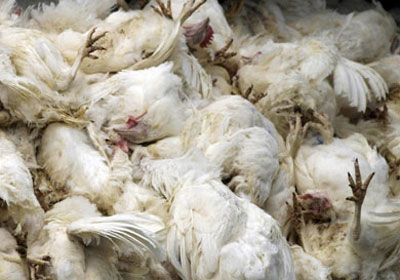40 Thousand died from bird and poultry Kafr El-Sheikh as a result of bird flu
Comments: 0 Share your feedback
Posted on: Saturday, February 23, 2013 - 1:25 PM
Last updated: Saturday, February 23, 2013 - 13:25

Mohammed Nassar
A state of terror severe انتابت people Kafr el-Sheikh; result of the return of bird flu in various hamlets and villages and cities of the province, which caused the deaths of thousands of birds and poultry and duck farms chickens and ducks, when peasants and farmers to maintain, also spread odors ways a number of villages centers "Qaleen, and Motobas, Riyadh, and Sidi Salem, "as a result of the spread of dead birds on the sides of those roads.
The official source Kafr El-Sheikh for "Sunrise" - who requested anonymity - that the disease has spread strongly into villages to maintain without any movement of officials, and confirmed that the disease during the past week the issue of more than 40 thousand birds losses exceeded one million pounds, and said there was no plan Directorate Veterinary Medicine to face catastrophic illness, which may eliminate a million birds to maintain over the coming months; pointing out that it needs an urgent plan of conservation and state officials; to eradicate the disease quickly before it turns into a plague kills all poultry. http://www.shorouknews.com/news/view.aspx?cdate=23022013&id=08dbf3c7-c689-4967-8d98-94f7c43622bb

